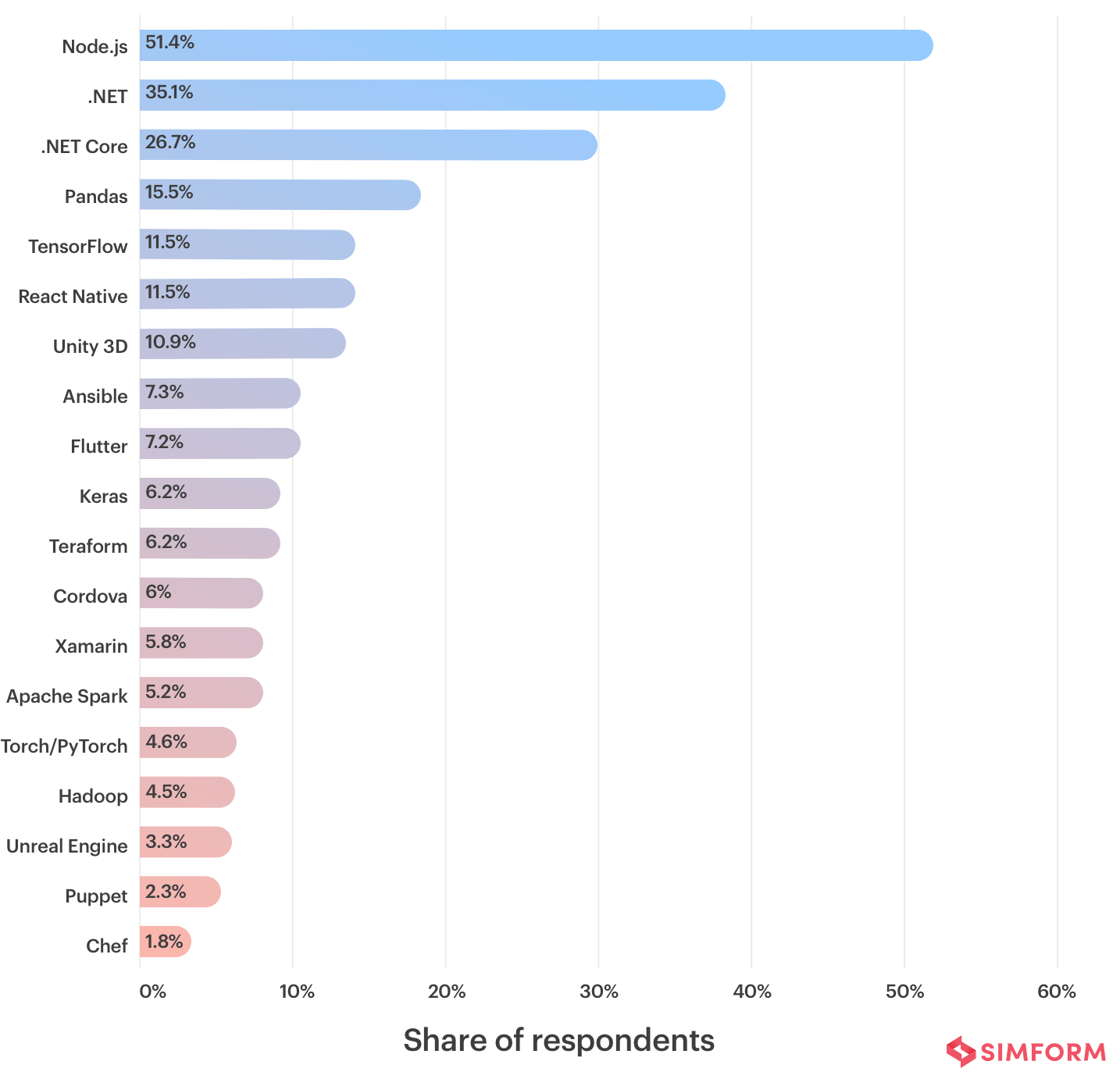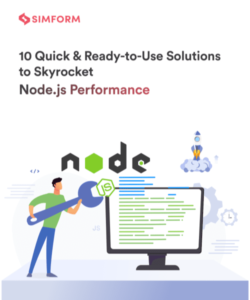One of the stepping stones to any web app development project is adopting a robust backend technology. While there are naturally a few technology trends gaining popularity in the industry, there can never be a one-size-fits-all solution. Adopting a backend technology depends on the type of organization, its development practices, and the target audience. This is, without a doubt, an exhausting exercise.
Understanding your dilemma, we have compared two of the leading backend technologies – Express.js and Node.js. Based on their standard features and functionalities, this comparative guide will help you understand which technology suits your organization and its backend requirements best. What’s more, all this information without any technical jargon or statistical analysis. We have kept it simple for you.
Editor’s note: Here, Hiren shares his opinion on Node.js & Express and helping our fellow CTOs to choose one. If you feel you need an advanced lookout to understand which one is better for your project, connect with our web app development expert to discuss your requirements.
So, let’s get started!
What is Node.js? – An Overview
Node.js is a server-side, Javascript-based runtime environment that’s a massive open-source tool. It attributes its success as a high-performance, scalable framework to the single-threaded process used for web loads and async programming. What’s more, you can use Node.js-based frameworks such as Express, Socket.io, and Meteor.js within it to enhance the backend capability of a project. Designed with real-time and push-based architectures, the technology is known to build single-page applications, websites, and backend API services.
Here are some market usage stats of Node.js as a backend technology:
- 63.22% of developers rated Node.js as the most loved tool in Stackoverflow Developer Survey Report 2021.
- 85% of Node.js developers use it for web app development, and the other 43% use it for enterprise-grade applications.
- 51.4% of developers regarded Node.js as the most-used tool earlier in 2020.

- StackOverflow Trends has noted an increase in the discussion around Node.js over the last decade covering almost 3.5% of questions.
Use cases of Node.js
- Streaming web applications
- Real-time software & Streaming apps (Collaboration tools used for video/audio conferencing, document editing, Chat applications, etc. )
- Complex single-page apps
- Microservices
- IoT-based applications
- Backends and servers
- Developing APIs
- Scripting and automation
Popular apps using Node.js as backend technology
- NASA revealed that Node.js made migrating data from legacy databases to a cloud database effortless. It created a single database for any query and reduced access time by a massive 300%.
- Twitter launched Twitter Lite with a 30% faster launch time and quick loading on slower connections.
- Netflix decreased startup times and significantly improved performance. They migrated their backend from Java to Node.js that resulted in a decrease in startup time from 40 minutes to 60 seconds.
- Trello implemented instant propagation of updates. As the application organizes tasks on an agile basis, they wanted a tool that instantly reflects the updates without reloading the page.
What is Express? – An Overview
Express.js or Express is an open-source server-side framework built for Node.js. Written in Javascript, it is part of MEAN, MEVN, and MERN stacks. Express provides plugins, template code, middleware packages, and routing functionality for faster and efficient web development. Additionally, the framework allows third-party integrations of libraries and features to make customization easier.
Here are some market usage stats of Express as a backend technology:-
A study by BuiltWith shows that Express is the 10th most popular framework in the Top 10k sites.
SimilarTech reports around 245,657 websites are built with Express worldwide, out of which 48,406 are made exclusively in the US.
According to a study by Statistics & Data, Express ranks 4th among the top 5 backend frameworks for 2021.
Use Cases of Express:-
- Single-page apps
- Reusable apps
- Middleware Applications
- RESTful APIs
- Serve and access static files using a browser
- Enterprise web applications
- eCommerce web applications
Popular Apps using Express as backend technology:-
- Twitter moved to Node.js Express in 2017 to speed up its mobile web app Twitter Lite.
- Uber utilized Express to develop their base web server, Bedrock, and optimize the middleware to provide security, internationalization, and other integrations for its infrastructure.
- Accuweather leveraged Express to build APIs for integration into other apps.
- IMDB also applied Express features to create APIs for developers to integrate them into their apps.
Find out how we improved the overall web experience for International Hockey Federation (FIH) using Node.js.
Pros and Cons – Node.js vs Express
Pros of Node.js
- Unopinionated: Builds everything from scratch with fewer restrictions, which gives developers the freedom to code their own way.
- Non-blocking I/O System: Lets you process several requests simultaneously, resulting in more scalability and faster performance.
- Active Community: Allows access to readily available solutions and codes that make it easy for startups and beginner developers.
- Easy to learn: Developers with experience in Javascript as a frontend language can easily adapt to the framework.
- Full-Stack Privilege: Allows Node.js developers to write frontend and backend both in Javascript. This enables the smooth deployment of apps and reduces the learning curve.
- Caching facility: Caches single modules in the application memory and eliminates the need to re-execute the code for faster response times.
- Extensive support: Assists developers with commonly used tools for different purposes such as testing or identifying project dependencies.
Cons of Node.js
- Productivity loss: Since everything needs to be written from scratch, you may experience a decline in productivity. Beginners find it difficult to build apps from scratch due to the non-opinionated nature of Node.js.
- Not suitable for extensive computing: Although Node.js supports complex apps, it doesn’t fare well with heavy computing (CPU intensive) apps. Additionally, it is less efficient at heavy calculations as it doesn’t support multi-threaded programming.
- Difficult to maintain code due to Async nature: Due to nested callbacks in Node.js and its heavy reliance on asynchronicity, it becomes tedious to maintain and difficult to understand code.
- Some of its tools lack quality: Some Node.js tools don’t match high-coding standards and are not correctly structured due to the open-source ecosystem.
Pros of Express
- Lesser Development Time: Express uses Javascript for both backend and frontend development. Thus, developers can generate codes faster without the need to learn a new language.
- Effective Error Handling: Express’s middleware is built to support catching errors in both synchronous and asynchronous codes.
- Handling I/O Requests: Express is an excellent choice for businesses that receive thousands of requests and notifications from users daily.
- Unopinionated Framework: Express has no strict rules on dealing with specific tasks, and you can leverage middleware packages and components in any way convenient for you.
- Easy Installation: Being a minimalistic framework, Express is easy to install, set up, and has a steep learning curve. This characteristic makes it suitable for beginners with a basic understanding of backend development.
Cons of Express
- Lack of Standardization: While Express does not require a specific structure, it can be an issue as team members increases and developers work on different functionalities of the app. Therefore, it becomes essential for teams to stick to a structure for the entire project.
- Callback Hell: Callbacks are among the most discussed issues with the Express framework as developers fail to comprehend the complicated writing style. However, the Express team has looked into the recurring problem and introduced some relief.
- Philosophy of Middleware: For developers who have never worked with Express, understanding and executing the middleware functions can be tricky.
Performance and Speed Comparison – Node.js vs. Express
While performance should not be a killer factor for small projects, it becomes extremely important to consider it when building complex and large projects. With that being said, let’s compare Node.js and Express in terms of performance.
How does Node.js stand out in terms of performance?
As it inherits the asynchronous and non-blocking from Javascript, Node.js creates a perfect environment for small tasks (micro-operations/tasks) that don’t affect the main application thread. What’s more, applications built in Node.js offer superior performance due to two main reasons: Multitasking and V8 Javascript engine.
- Node.js’s event-driven architecture allows efficient multitasking, which enhances applications’ performance.
- Node.js uses a V8 Javascript engine, which works very fast in a short ramp-up time.
The framework processes many requests simultaneously compared to other backend solutions. In fact, a large number of tech giants are turning towards Node.js for its performance. Paypal, for one, saw a 35% drop in the average response time and doubled their requests per second. Another such example is Linkedin that reduced its servers from 30 to 3 as they migrated to Node.js. Now doesn’t that speak volumes?
How does Express stand out in terms of performance?
Express is a big hit among developers for the speed it delivers to Node.js applications. In terms of speed, a simple ‘Hello, World’ benchmark performance shows that an Express program can handle 11,202 requests per second.
The developers at PayPal tested two of their apps built with the same functionality to determine their performances: one was developed in Java and the other was built with Express and additional open-source codes. In the end, Paypal found that the app built with Express achieved double requests per second as compared to the Java app, while the average response time for the same page decreased by 35%.
Furthermore, the pages were served to the users 200ms faster than earlier.
Application architecture – Node.js vs. Express
When choosing a framework, it’s important to choose flexibility and avoid any strict enforcement of architecture and guidelines. As a matter of fact, it’s always recommended to treat a framework as a guide, not methods, and standards. That said, let’s juxtapose Node.js and Express with each other and check whether they are flexible in terms of architecture.
What kind of architecture does Node.js support?
Under the hood, Node. js leverages the Single-threaded Event Loop architecture that enables it to handle multiple concurrent requests with high performance. However, Node.js also lets you use MVC/ MVP architecture pattern, which eases isolating and onboarding issues in the application codebase. In addition to this, it creates multiple views for the same data and supports asynchronous communication between various components.
Here’s how you benefit from the async architecture of Node.js:
- Processes multiple concurrent requests simultaneously and offers high performance.
- Ensures faster and flexible development of modules.
- Reduces time-to-market of applications.
What kind of architecture does Express support?
Express does not require a specific architecture, and developers have the liberty to determine a structure for their web apps. However, MVC (Model-View-Controller) is the preferred and most common architecture type for Express apps.
Scalability – Node.js vs. Express
Frameworks significantly influence the web application scalability, therefore, the right choice of framework is important. Here’s how Node.js and Express stand out in terms of scalability.
How scalable is Node.js?
Node.js builds highly scalable applications. The non-blocking I/O and event-driven models handle multiple concurrent requests. Moreover, the event-loop mechanism enables the server to process maximum requests. It’d be best if the multiple services are distributed to separate work servers, it increases Node.js’ efficiency and scalability. That way, different development teams can segregate the tasks and build applications more quickly and scalably with Node.js.
How scalable is Express?
Express derives various features from Node.js, and one of them is the non-blocking servers that can handle user requests better. As a result, it is easier for developers to create easily scalable web apps. The Express framework is equipped with similar scalability and features as the Nginx and Apache servers. Moreover, being lightweight, leveraging it to build large-scale applications is achievable.
Ease of Testing – Node.js vs. Express
To be able to work without a glitch under continuous, high load and growing market expectations, your application development project needs to go through a series of tests to ensure compliance with the UI standards, compatibility, and usability. Here’s how Node.js and Express stand out when compared with testing.
How easier is it to test Node.js applications?
Node.js offers competent testing and debugging capabilities with its rich ecosystem of third-party packages. Various automated testing tools/frameworks like Mocha, Jest, Lab and Code, Jasmine, and AVA create a sound testing ecosystem for Node.js apps. Moreover, you could use testing libraries such as Mocha, Jest, and Chai to offer a seamless, bug-free experience to your users.
How easier is it to test Express applications?
Similar to Node.js, there are many defined best practices for conducting tests on Express apps. With testing frameworks like Mocha, Jest, Ava, and Postman combined with libraries like Sinon, Chai, and Supertest, you can automate APIs and middleware tests of an Express app.
Microservices compatibility – Node.js vs. Express
Is Node.js compatible with Microservices architecture?
Both Node.js and Microservices build smaller parts of services and code modules. Node.js is suitable for developing scalable apps as it’s efficient at handling multiple concurrent requests. Thus, it makes an absolute combination for building enterprise-grade complex applications with higher scalability.
Is Express compatible with Microservices architecture?
The unopinionated structure of Express makes it suitable to combine with a microservice architecture. This helps to achieve higher scalability and improve performance. In fact, Express Gateway leverages Express.js functionality to build a Microservices API Gateway for organizations to implement a microservice structure for faster development.
Database support – Node.js vs. Express
How good is the database support for Node.js?
Node.js supports all kinds of databases like relational and NoSQL databases. However, it’s best to use a NoSQL database like MongoDB as it stores data in JSON objects, which offers more accessibility for Javascript-based backends like Node.js.
As a matter of fact, you can use “mongoose” to manage relationships with data. The object data-modeling library is exclusively built for Node.js and MongoDB. Moreover, it boosts productivity by increasing code readability, maintaining code flexibility, and providing modeling for applications’ data among others.
How good is the database support for Express?
Being a minimalistic framework, Express does not come with database integration among its core features and does not promote using any particular database. This feature allows you to connect with a database, whether it’s MySQL, MongoDB, Oracle, SQL Server, or CouchDB, simply by loading a Node.js driver in the app.
Read how we helped Red Bull build a scalable solution using Node.js.
Community – Node.js vs. Express
How big is the community around Node.js?
Node.js holds a well-supported and robust community. It is reported on Stackoverflow that 51.4% of professional developers use Node.js for frameworks, libraries, and tools. Tech giants such as Amazon, Facebook, and Google have made significant contributions to the Node.js environment, making the technology more credible.
There are several community forums for Node.js such as,
Reddit
Nodebb
Dev.to
Github
Stackoverflow
How big is the community around Express?
Being one of the most popular frameworks worldwide, the Express open-source community constantly reviews and improves its codes. The Express technical committee meets online once every two weeks to discuss development and maintenance issues, and the meetings are available on their Express YouTube channel. It has 52.6k followers, 145+ releases, and 282+ contributors on GitHub. Express also has a decent following of 5559 members on Gitter with an Express chatroom for discussions related to the framework.
Hiring developers – Node.js vs. Express
How convenient is it to hire Node.js developers?
The large community of Node.js developers makes it easier to hire Node.js developers. The average range for hiring Node.js developers as dedicated or freelancing resources varies between $70 to $90 per hour in North America, $50 to $70 per hour in Eastern Europe. In Asian countries like India, it is from $20 to $40 per hour. With a few considerations in mind, such as the portfolio and fundamentals of Javascript, one should be able to hire the right Node.js developers for their projects.
How convenient is it to hire Express developers?
Owing to its immense popularity in the backend community, hiring Express developers with extensive knowledge is no challenge. The average hourly cost of hiring Express developers is $35 per hour but it largely depends on the years of experience a developer has gained over the years. Moreover, Express developers are skilled Node.js developers. They have a good understanding of Node.js and find it much easier to work with Express.js.
Conclusion
Now that you have a thorough understanding of the various features that both these platforms offer, you would want to understand how companies have leveraged them worldwide. Here is a list of famous use cases for Node.js and Express to help you make a final call-
Choose Node.js if:
- You want to build a web application to stream content.
- You want to build a performant single-page application.
- You want to build web applications enriched with efficient data processing capabilities.
- You wish to create a real-time multi-user web application.
- You want to create browser-based game applications.
Choose Express if:
- You want to scale up your app and handle multiple user requests on the app
- You want to build a real-time application that leverages the non-blocking Express servers.
- You want to build a website where millions of users share and export images similar to Unsplash.
- You want to create an app like GoDaddy for registering domains and offering web hosting services.
- You want to develop a web app like Coursera that provides open online courses.



